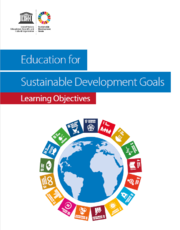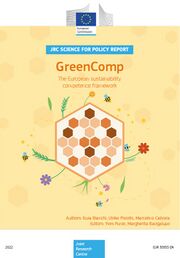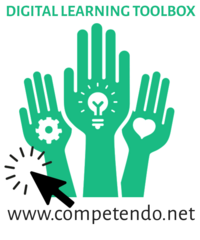|
|
| (44 intermediate revisions by the same user not shown) |
| Line 1: |
Line 1: |
| − | <div class="left-column-contentinner"> | + | <div class=methodpage-content> |
| | + | <div class=teaser-text><div style="background: #eee; float: left; padding: 0px 5px 0px 5px; margin-right: 5px;"><i class="fas fa-arrow-left"> </i> [[During]]</div> Activists, interest groups, politicians, or companies – each makes a contribution or has the potential to contribute to societal development. Sustainable Development is a vision, which is promoted through individuals. Education for Sustainable Development is empowerment for sustainable change. Learning and education builds a bridge between the content of sustainability and the initiative of the people.</div> |
| | + | <div class=left-box> |
| | + | [[File:Esdlo.png |link=http://unesdoc.unesco.org/images/0024/002474/247444e.pdf | right | 180px | border]] |
| | + | ===Education for Sustainable Development (ESD)=== |
| | + | Empowers learners with knowledge, skills, values and attitudes to take informed decisions and make responsible actions for environmental integrity, economic viability and a just society. |
| | + | [https://en.unesco.org/themes/education-sustainable-development/what-is-esd UNESCO]. |
| | | | |
| − | <div class=teaser-text>Activists, interest groups, politicians, or companies – each makes a contribution or has the potential to contribute to societal development. Sustainable Development is a vision, which is promoted through individuals. Education for Sustainable Development is empowerment for sustainable change. Learning and education builds a bridge between the content of sustainability and the initiative of the people.</div>
| + | A detailed description of Education for Sustainable Development's learning objectives can be found in the brochure: [http://unesdoc.unesco.org/images/0024/002474/247444e.pdf ESD Learning Objectives] |
| | + | </div> |
| | | | |
| − | <div class=teaser-box>
| + | The subject of Education for Sustainable Development (ESD) is defined by the term "sustainability", coined by the United Nations Commision "Our Common Future". Although environmental issues are central to this approach to education, this definition shows that they are not the sole core. Sustainability here is related to the environment, the social, the economic. In addition, "development" refers to the fact that ESD is a transformative approach to education - towards a more sustainable world. |
| − | ===[[Sustainable Development: Background]]===
| |
| − | [[File:Article.png | left]]The most popular and most widely accepted definition of Sustainable Development from the World Commission on Environment and Development is: “Sustainable development is development that meets the needs of the present without compromising the ability of future generations to meet their own needs.” But what does this mean in your society?
| |
| − | </div>
| |
| | | | |
| | + | This also shows how strongly ESD is linked to [[Active Citizenship Education | active citizenship education]], the commitment to a democratic and sustainable society. |
| | + | |
| | <div class=teaser-box> | | <div class=teaser-box> |
| | + | ===Sustainable Development: Definition=== |
| | + | “Sustainable development is development that meets the needs of the present without compromising the ability of future generations to meet their own needs.” (United Nations [https://www.un-documents.net/our-common-future.pdf Commission Our Common Future]) |
| | | | |
| − | ===[[Education for Sustainable Development: Background]]===
| + | "Education is a human right with immense power to transform. On its foundation rest the cornerstones of freedom, democracy, and sustainable human development.” |
| − | [[File:Article.png | left]]When a society wants to make essential changes to its way of being and functioning fundamentally in every of its parts, it needs actors who can think in a new way and carry out concrete actions. Education on sustainable development starts at this interface between citizens and sustainability.
| + | [http://www.unicef.org/sowc99/sowc99a.pdf Kofi Annan] |
| | </div> | | </div> |
| | + | <hr class=boldline> |
| | + | ===Video: What is Education for Sustainable Development?=== |
| | + | <youtube>YUFqamr78Xk</youtube> |
| | + | |
| | + | <hr class=boldline> |
| | + | <div class=left-box> |
| | | | |
| − | <div class=teaser-box>
| + | ===GreenComp - EU Competence Framework=== |
| | + | [[File:Greencomp.jpg| 180px | right |link=https://publications.jrc.ec.europa.eu/repository/handle/JRC128040 | border]] |
| | + | The European sustainability competence framework, created in 2022 by the European Commission/Joint Research Centre. |
| | | | |
| − | ===[[Checklist for greater sustainability and fairness at your event]]===
| + | GreenComp identifies a set of sustainability competences to feed into education programmes to help learners develop knowledge, skills and attitudes that promote ways to think, plan and act with empathy, responsibility, and care for our planet and for public health [https://publications.jrc.ec.europa.eu/repository/handle/JRC128040 Download]. |
| − | [[File:check.png | left ]] Practical ideas for planning your workshops in a globally responsible way | |
| − | </div>
| |
| | | | |
| − | <div class=teaser-box>
| |
| − | ===[[Sustainable Development and Me]]===
| |
| − | [[File:Method.png | left]]Examples taken from all day life, explored in groups: In example mobile phone, jeans, coffee, steak. Participants learn that sustainable development has something to do with their everyday life.
| |
| − | </div>
| |
| | | | |
| − | <div class=teaser-box>
| |
| | | | |
| − | ===[[Scarcity vs. Abundance]]=== | + | <div class="mw-collapsible mw-collapsed"> |
| − | [[File:Method.png | left]]Examples taken from all day life, explored in groups: In example mobile phone, jeans, coffee, steak. Participants learn that sustainable development has something to do with their everyday life.
| + | ====1. Embodying sustainability values==== |
| − | </div>
| |
| | | | |
| − | <div class=teaser-box>
| + | * 1.1 Valuing sustainability. To reflect on personal values; identify and explain how values vary among people and over time, while critically evaluating how they align with sustainability values. |
| − | ===[[Sustainable Code of Conduct]]===
| + | *1.2 Supporting fairness. To support equity and justice for current and future generations and learn from previous generations for sustainability. |
| − | [[File:Method.png | left]]Which rules and incentives can we establish to act sustainably during our meetings? Ask participants to brainstorm ideas for your Code of Conduct.
| + | *1.3 Promoting nature. To acknowledge that humans are part of nature; and to respect the needs and rights of other species and of nature itself in order to restore and regenerate healthy and resilient ecosystems. |
| − | </div>
| |
| − | <div class=teaser-box>
| |
| − | ===[[A Pair of Jeans]]===
| |
| − | [[File:Method.png | left]]Fairness and economy are illustrated with the example of the way a pair of jeans begins with cotton grown in Africa, then is manufactured before it is sent to a shop in your country.
| |
| − | </div>
| |
| − | <div class=teaser-box>
| |
| | | | |
| − | ===[[City Rally on Sustainable Development]]=== | + | ====2.1 Systems thinking==== |
| − | [[File:Method.png | left]]City rallies help everyone become more familiar with the place where the meeting is held, help you and your participants get to know one another, and provide information on sustainable development.
| + | *2.1 Embracing complexity in sustainability. To approach a sustainability problem from all sides; to consider time, space and context in order to understand how elements interact within and between systems. |
| − | </div>
| |
| − | <div class=teaser-box>
| |
| | | | |
| − | ===[[Make Vegetarian Food the Norm]]===
| + | * 2.2 Critical thinking. To assess information and arguments, identify assumptions, challenge the status quo, and reflect on how personal, social and cultural backgrounds influence thinking and conclusions. |
| − | [[File:Method.png | left]]In contrast to most trainings and seminars you might set vegetarian food as "normal" and ask those, who eat meat, to announce that to the organizers, so they could order meat for them. Often teams do it the other way round, where vegetarians have to announce it particularly, that they don't want to eat meat.
| + | * 2.3 Problem framing. To formulate current or potential challenges as a sustainability problem in terms of difficulty, people involved, time and geographical scope, in order to identify suitable approaches to anticipating and preventing problems, and to mitigating and adapting to already existing problems. |
| − | </div>
| |
| | | | |
| − | <div class=teaser-box>
| + | ====3. Envisioning sustainable futures==== |
| − | ===[[Campaign: Alternatives to Plastic Bags]]=== | + | * 3.1 Futures literacy. To envision alternative sustainable futures by imagining and developing alternative scenarios and identifying the steps needed to achieve a preferred sustainable future. |
| − | [[File:Article.png | left]]Good Practice on how to connect Education for Sustainable Development with civil engagement.
| |
| − | </div>
| |
| | | | |
| − | <div class=teaser-box>
| + | *3.2 Adaptability. To manage transitions and challenges in complex sustainability situations and make decisions related to the future in the face of uncertainty, ambiguity and risk. |
| − | ===[[The Forest Game]]===
| + | *3.3 Exploratory thinking. To adopt a relational way of thinking by exploring and linking different disciplines, using creativity and experimentation with novel ideas or methods. |
| − | [[File:Method.png | left]]This is an example of a short simulation game which helps the participants understand the concept of sustainable development.
| |
| − | </div>
| |
| | | | |
| | + | ====4. Acting for sustainability==== |
| | + | *4.1 Political agency. To navigate the political system, identify political responsibility and accountability for unsustainable behaviour, and demand effective policies for sustainability. |
| | | | |
| − | </div> <!-- the end of the big left column --> | + | *4.2 Collective action. To act for change in collaboration with others. |
| | + | * 4.3 Individual initiative. To identify own potential for sustainability and to actively contribute to improving prospects for the community and the planet. |
| | + | </div> |
| | | | |
| − | <div class="right-column-contentinner"> | + | </div> |
| | | | |
| − | ===Navigation:=== | + | <hr class=boldline> |
| − | [[File:back.gif | back to the main section]] [[During]]
| + | <div class=teaser-box> |
| − | *[[Education for Sustainable Development]]
| |
| − | ** [[Sustainable Development: Background]]
| |
| − | ** [[Education for Sustainable Development: Background]]
| |
| − | **[[Checklist for greater sustainability and fairness at your event]]
| |
| − | ** [[Sustainable Development and Me]]
| |
| − | ** [[Scarcity vs. Abundance]]
| |
| − | ** [[Sustainable Code of Conduct]]
| |
| − | ** [[A Pair of Jeans]]
| |
| − | ** [[City Rally on Sustainable Development]]
| |
| − | ** [[Make Vegetarian Food the Norm]]
| |
| − | ** [[Campaign: Alternatives to Plastic Bags]]
| |
| − | ** [[The Forest Game]]
| |
| | | | |
| − | <hr style="border:0; border-bottom: 1px dashed #d21e3d; width: 100%;"> | + | ===Articles, Checklists and Methods=== |
| − | <div class=right-box> "Education is a human right with immense power to transform. On its foundation rest the cornerstones of freedom, democracy, and sustainable human development.” | + | <div class="mw-collapsible mw-expanded" data-expandtext="What's inside?"> |
| | + | <i class="fas fa-glasses"></i> [[Education for Sustainable Development: Background]]<br> |
| | + | <i class="fas fa-glasses"></i> [[Sustainable Development: Background]]<br> |
| | + | <i class="fas fa-glasses"></i> [[Digitalisation and the Environment]]<br> |
| | + | <i class="fas fa-glasses"></i> [[The Potential of Low-Tech]]<br> |
| | + | <i class="fas fa-cog"></i>[[Sustainable Development and Me]]<br> |
| | + | <i class="fas fa-cog"></i>[[Sustainable Code of Conduct]]<br> |
| | + | <i class="fas fa-cog"></i>[[A Pair of Jeans]]<br> |
| | + | <i class="fas fa-cog"></i>[[Make Vegetarian Food the Norm]]<br> |
| | + | <i class="fas fa-cog"></i>[[Campaign: Alternatives to Plastic Bags]]<br> |
| | + | <i class="fas fa-cog"></i>[[The Forest Game]]<br> |
| | + | <i class="fas fa-cog"></i>[[Checklist for greater sustainability and fairness at your event]]<br> |
| | | | |
| − | [http://www.unicef.org/sowc99/sowc99a.pdf Kofi Annan]
| |
| | </div> | | </div> |
| − | <hr class=simpleline> | + | </div> |
| − | <div class=right-box>
| |
| − | '''Handbook:'''
| |
| | | | |
| − | [[File:T-kit-13.jpg | link=https://pjp-eu.coe.int/en/web/youth-partnership/t-kit-13-sustainability-and-youth-work]]
| + | <hr class=boldline> |
| | | | |
| − | E. Keen, J. Pinkeviciute, A. Hayes, A. Berecz, B. Akyüz
| + | <div class=left-box> |
| | + | <i class="fas fa-book-open" style="font-size: 54px; color: #ccc; float:right;"></i> <i class="fas fa-desktop" style="font-size: 54px; color: #ccc; float:right;"> </i> |
| | | | |
| − | ===Sustainability and youth work=== | + | ===Materials: Education for Sustainable Development/ Global Learning=== |
| | + | <noinclude>{{:Material - ESD Global Learning}}</noinclude> |
| | | | |
| − | CoE/EUC 2018: [https://pjp-eu.coe.int/en/web/youth-partnership/t-kit-13-sustainability-and-youth-work Download]
| |
| | </div> | | </div> |
| − | <hr class=simpleline>
| |
| − | <div class=right-box>
| |
| − | '''Handbook:'''
| |
| | | | |
| − | [[File:sdhandbook.jpg | 250px | link=http://mitost.org/editions/esdac/1/esdac.pdf/]]
| |
| | | | |
| − | A. Galfayan, S. Wehrsig, <br>N. Zimmermann
| |
| | | | |
| − | ===Environment and Civil Involvement===
| |
| − |
| |
| − | How Can We Connect Education for Sustainable Development and Active Citizenship Empowerment?
| |
| − |
| |
| − | MitOst editions 2013: [http://mitost.org/editions/esdac/1/esdac.pdf/ Download]
| |
| | | | |
| | </div> | | </div> |
| − | | + | <div class="methodpage-infos"> |
| − | | + | <noinclude>{{:Navi During}}</noinclude> |
| | | | |
| | </div> | | </div> |



















